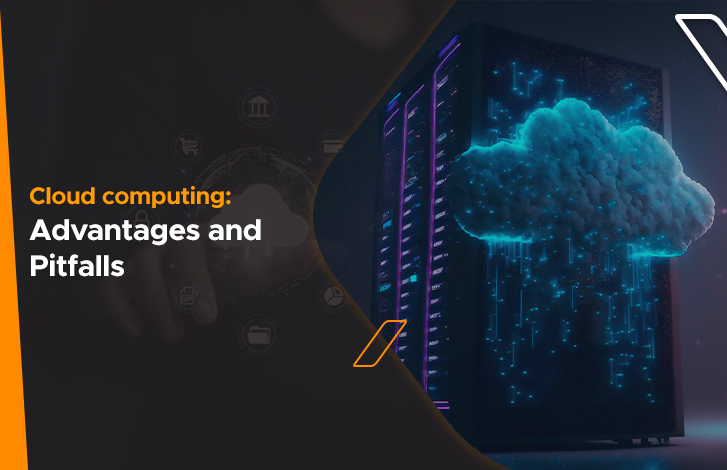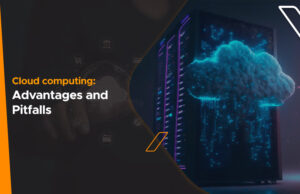What is Cloud Computing?
Cloud computing has revolutionized the way businesses and individuals access and manage data, applications, and resources. It offers a flexible and scalable approach to computing, enabling organizations to optimize their operations and leverage powerful technologies without substantial upfront investments.
It refers to the delivery of services over the internet without relying on local servers or physical storage. With cloud computing, users can access a vast network of remote servers hosted in data centres around the world. These servers are managed by cloud service providers.
The Benefits of Cloud Computing
Cloud computing offers numerous benefits to businesses and individuals. It provides on-demand access to computing resources, allowing organizations to scale up or down as needed. Following is a round-up of the benefits of using cloud-based technology:
Reduced Costs
The primary factor driving businesses to adopt cloud computing is its significantly lower cost compared to hardware technologies. As the cloud offers tremendous storage space, businesses no longer need to save data on hardware, saving them money and resources.
High speed
We can easily deploy services, thanks to cloud computing. It allows us to quickly access the resources required, saving time.
Improved Accessibility
With the help of cloud computing, you can access your data from any location. It helps employees access resources remotely, providing an edge to work from home employment. It may be simpler to maintain business continuity when you rely less on on-premise technology.
Back-up and recovery
One of the biggest advantages of cloud computing is data recovery and backup. When data is kept on the cloud, it is simpler to retrieve it and back it up, which is a labour-intensive procedure with on-premise equipment.
Competitive edge
Cloud computing helps organizations gain a competitive edge with the latest technologies. By providing access to the most popular and in-demand applications and taking care of all the manual work involved in installing and maintaining the applications for the business, it allows the company to concentrate on remaining competitive in the market.
Easy implementation
Cloud infrastructure is easily accessible. With the help of cloud computing, businesses can continue using the same applications and business processes without having to worry about the technical aspects of the backend.
No need for physical storage
When your business uses the cloud for storage, a physical storage facility is not necessary. However, for disaster management and company continuity, a backup is advised.
Automatic Software Integration
Software integration happens automatically in the cloud. The integration and customization of applications don’t demand any more work.
Reliability
One of the biggest advantages of cloud hosting is the fact businesses do not have to worry about the constant changes taking place as they automatically stay up-to-date.
Unlimited storage
The storage capacity of the cloud is endless and can be increased at any moment for a very low price.
Collaboration
Cloud computing helps employees collaborate with each other regardless of being in different locations.
Risks of Cloud Computing
Cloud computing does not come without its challenges. Some of the risks are:
Data hosted by a third party
Data governance and security may be an issue, given the potentially sensitive data that your company may need to when your data is hosted by a third party. However, reliable vendors work with top security professionals that constantly monitor and safeguard your data. Your data is even better protected from prying eyes, thanks to the automatic functional and technical updates.
With top-level vendors, you always have access to your data and effective security measures are in place to prevent unauthorised access. Therefore, in practise, cloud-based systems are frequently much more secure than their on-premises counterparts.
Security Issues
If adequate steps are not taken to secure data, sharing access to cloud resources could result in significant security risks with cloud computing. With numerous cloud computing functions, it is not the same as traditional infrastructure, which would have a direct connection to the on-premise infrastructure with the isolated resources. Thus, even while cloud computing can be modified to reduce these risks by careless resource allocation and utilisation, it can still become just as vulnerable. Thus, while managing crucial data and resources in cloud computing, qualified staff is quite important.
Minimum Control
Risks associated with cloud computing include reduced operational management and oversight. There is a lack of control because cloud providers run the infrastructures and external connections are necessary for communication between consumers and the provider. Thus, only reputable and reliable cloud providers should manage such sensitive data.
Portability
The likelihood of limited portability between cloud providers rises as a result of privacy. Each of these cloud service providers serve more like a vault because there isn’t an industry standard that would allow the diversion of consumer dependence. While switching between these cloud providers is still doable, it gets much more challenging as you go along. One supplier may offer some features while the other would not, and vice versa.
Conclusion
The future of cloud computing seems bright as more businesses opt for cloud-based solutions due to its numerous benefits such as scalability, flexibility, cost-effectiveness, and accessibility. It has reshaped the way organizations operate and individuals access and utilize computing resources. Cloud computing is expected to play a pivotal role in driving innovation, powering a digital transformation.







